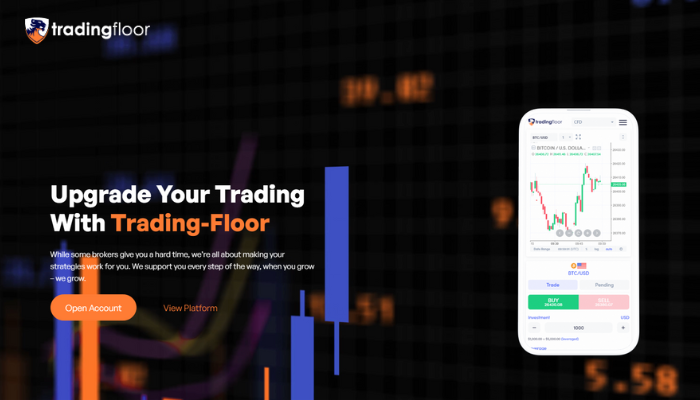Can You Trust Your Broker? Uncovering the Conflicts of Interest with Trading-Floor.io

Trust is an essential element in the constantly changing domain of online trading. Traders entrust brokers with their hard-earned money in order to navigate the intricacies of the financial markets with confidence and transparency. Nevertheless, it is a fact that not all brokers prioritize the well-being of their consumers. The brokerage industry’s potential for conflicts of interest can result in practices that may not be consistent with the objectives of a trader. It is imperative for any trader who wishes to make well-informed investment decisions to comprehend these conflicts.
Understanding Broker Conflicts of Interest
Conflicts of interest in brokerage firms occur when a broker’s financial incentives are not aligned with those of their clients. These conflicts can arise in various forms, potentially impacting the quality of service and the fairness of trading practices. A comprehensive understanding of these issues can help traders identify brokers who truly prioritize their clients’ interests.
Commission-Based Earnings
One of the most prevalent sources of conflict is commission-based earnings. Brokers often earn money by executing trades on behalf of their clients, charging a commission for each transaction. This structure can incentivize brokers to encourage frequent trading, known as “churning,” to increase their commissions. While some trading is necessary, excessive trading can erode a trader’s profits through unnecessary fees.
Example: A study by the North American Securities Administrators Association (NASAA) found that excessive trading is one of the most common forms of misconduct by brokers, often resulting in substantial financial losses for clients.
Proprietary Trading
Proprietary trading involves brokers using their own funds to trade in the market. While this practice can be profitable for the brokerage firm, it can lead to situations where the broker prioritizes its interests over those of its clients. Proprietary trading may create a conflict if brokers execute trades that benefit the firm but are not in the best interest of their clients.
Example: In 2013, the Volcker Rule was implemented as part of the Dodd-Frank Act to restrict banks from engaging in proprietary trading, aiming to reduce conflicts of interest and protect clients from potential abuses.
Biased Recommendations
Brokers may also face conflicts when recommending specific financial products or investment opportunities. Some brokers receive incentives or commissions from third-party companies for promoting certain stocks, mutual funds, or financial instruments. This practice can lead to biased recommendations that do not necessarily align with the client’s financial goals or risk tolerance.
Example: The Financial Industry Regulatory Authority (FINRA) has issued guidelines to ensure that brokers disclose any conflicts of interest when recommending investment products to clients.
How Trading Floor Mitigates Conflicts of Interest
Amidst the challenges of navigating potential conflicts of interest, Trading Floor stands out by prioritizing transparency and aligning its services with the best interests of its clients. Trading Floor is committed to providing a trustworthy and reliable platform for traders of all experience levels.
Transparent Fee Structure
Trading Floor offers a transparent fee structure that minimizes conflicts of interest associated with commission-based earnings. By clearly outlining all fees and charges, the platform ensures that traders understand the cost implications of their trading activities. This transparency empowers traders to make informed decisions without the fear of hidden costs eroding their profits.
Focus on Client-Centric Solutions
Rather than engaging in proprietary trading, Trading Floor emphasizes providing tools and resources that enhance the trading experience for its clients. The platform’s trading room overview offers traders access to a wealth of market data, technical analysis tools, and real-time insights. These resources empower traders to make their own informed decisions, reducing the need for biased recommendations.
Diverse Account Options
Trading Floor recognizes that every trader is unique, with different financial goals and risk appetites. To address this, the platform offers a variety of account types tailored to meet the specific needs of different traders. Whether a trader is a beginner seeking to learn the ropes or an experienced professional looking to optimize their strategies, Trading Floor provides account options that align with individual preferences:
- Standard Package:
The Standard package provides essential features to get started in the financial markets. It includes a free demo account for practice, competitive spreads starting from 1.5 pips, and maximum leverage of up to 1:200. Traders also benefit from a bonus of up to 3% and an introductory call from a personal account manager. - Silver Package:
Building upon the Standard package, the Silver package offers additional features to enhance the trading experience. It includes a higher maximum leverage of up to 1:300 and a bonus of up to 5%, along with continued support from a personal account manager. - Gold Package:
Designed for traders seeking a more advanced experience, the Gold package offers competitive pricing with spreads starting from 0.8 pips and maximum leverage of up to 1:400. Traders receive a bonus of up to 7% and a monthly session with a senior market analyst for valuable insights and guidance. - VIP Package:
The VIP package represents the pinnacle of Trading Floor’s offerings, providing top-tier features for experienced traders. With spreads starting from 0 pips and maximum leverage of up to 1:500, traders enjoy unparalleled trading conditions. The package includes a bonus of up to 15%, 24/7 customer support, and a dedicated personal account manager, along with exclusive trading strategies and investment research.
Commitment to Education
To further mitigate conflicts of interest, Trading Floor is committed to educating its clients. The platform offers a range of educational resources, including webinars, tutorials, and market analysis, to help traders develop their skills and knowledge. By empowering traders with education, Trading Floor enables them to make informed decisions that align with their financial objectives.
The Importance of Trust in Trading
Trust is the cornerstone of any successful trading relationship. Traders need to have confidence that their broker is acting in their best interests, providing fair and transparent services. By understanding the potential conflicts of interest that can arise in the brokerage industry, traders can make more informed choices when selecting a platform to partner with.
For traders seeking a platform that prioritizes transparency, education, and client-centric solutions, Trading Floor offers a comprehensive trading experience. Whether they are novices or experienced traders, Trading Floor provides the tools and resources needed to succeed in the financial markets. Traders are invited to explore the platform’s diverse account options and discover a trading environment where their interests come first.
In conclusion, while conflicts of interest are an inherent part of the brokerage industry, platforms like Trading Floor are dedicated to mitigating these conflicts and prioritizing the interests of their clients. By choosing a broker that values transparency and client satisfaction, traders can embark on their trading journey with confidence and peace of mind.
Disclaimer: This article is for informational purposes only and does not constitute financial advice. Trading involves risk, and traders should carefully consider their financial situation and consult with a financial advisor before making any investment decisions. Trading Floor offers tools and resources to support trading journeys, but success is not guaranteed.





